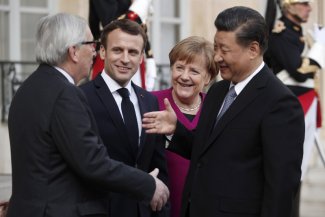Xi Jinping’s visit to Europe: prelude to an EU-China summit

On 21-27 March, the leader of the People’s Republic of China (PRC), Xi Jinping, paid official bilateral visits to three European countries, Italy, Monaco and France. During these meetings a range of economic agreements were signed, including a contract to purchase 300 Airbus aircraft for around €30m (see Annex). In addition, while Xi was in Paris, at French president Emmanuel Macron’s initiative, a meeting in a new format was held on 26 March between Xi, Macron, German Chancellor Angela Merkel, and the EC’s chairman Jean-Claude Juncker. Their discussions included the future of relations between the EU and China, and also their prospects for cooperation on the global stage. Xi’s visit to Europe came ahead of the annual EU/China summit scheduled for 9 April.
Commentary
- Xi’s European visits came against a background of the EU adopting a tougher stance towards China in recent months. In March, the European Commission and HR Mogherini published a joint communication calling China a ‘strategic competitor’ to the EU in the economic sphere. The EC and HR/VP have also appealed for a “broad redefinition of the foundations of [the two sides’] mutual relations”, which are currently unbalanced in China’s favour. Brussels and some EU capitals are also stepping up diplomatic action with the aim of unifying and coordinating the stance of the whole EU towards China. Among the questions discussed at the EU forum are the potential limiting of market access for Chinese investors looking to obtain technology; reducing Chinese entities’ access to building critical infrastructure; and making access to the EU market conditional on China opening up further to European exports and investments. Beijing is trying to counteract the protectionist tendencies in EU politics, and to maintain the EU’s asymmetrical openness to Chinese economic expansion. These bilateral dialogues with selected EU members are intended to weaken the EU’s unified response, and the latest visit was intended to take advantage of tensions between Rome on one side and Berlin & Paris on the other. The bilateral purchasing missions organised by Beijing and aimed at large European businesses are deepening EU countries’ dependency on China’s market and finance. In this field, the agreements signed in Paris and Rome represent a continuation of the formula established by Prime Minister Li Keqiang’s visit to Berlin last year. China is also trying to take advantage of the anti-American moods in the EU caused by Washington’s pressure to ban Huawei from the European market. In the Chinese media narrative, Europe is currently facing a historic choice as to whether it will manage to become independent of the US, and the American demands are presented as a blow against Europe’s competitiveness in the field of new technologies.
- Xi Jinping’s visit to Italy is part of China’s attempts to exploit the differences between the EU’s biggest states, particularly along the north-south divide. The fact that Rome and Beijing are conducting an independent dialogue on questions which are sensitive from the viewpoint of EU policy can be read as a criticism by Italy of French and German ambitions to shape the European agenda towards China. The most resonant political implication of Xi’s visit to Rome came with the signing of a memorandum of understanding on Italy joining the Belt & Road Initiative, which European and Chinese media presented as an important signal of Rome’s acknowledgment of China’s ambitions in Eurasia. The move brought criticism from Italy’s European partners, as well as accusations of fracturing European unity towards China. Commissioner Günther Oettinger appealed for a blockade of similar agreements at EU level. However, the memorandum Italy signed does not impose any binding commitments on Rome, as was the case for other European countries (including Poland and Hungary) which have already concluded similar agreements with the PRC. The scale of the economic agreements signed during the visit is not significant (see Annex), and they will not strongly affect economic relations between Italy and China. Indeed, these agreements’ very implementation is in question, due to the general incompatibility of the Chinese financial offer with the EU’s legal framework and business environment. This situation is further complicated by the conflict within the Italian ruling coalition on cooperating with China. The Northern League remains sceptical of Beijing’s intentions, and its leader Matteo Salvini sees himself as an ideological ally of President Donald Trump. On the other hand, the Five-Star Movement and Prime Minister Giuseppe Conte seem to believe that agreement with China and joining the Belt & Road Initiative will bring substantial benefits to the Italian economy.
- Meanwhile, France’s aim was to complement the bilateral political dimension of Xi’s visit (see Annex) with questions of cooperation on global policy issues and China/EU relations. Macron’s intention was to portray himself as the leader of a more balanced EU-China relationship, with the aim of limiting the asymmetry in economic relations between the two, which is presently unfavourable for European states. At the same time, the French president made a bid for Chinese support for France’s global agenda, and aimed to forge agreements that could benefit French economic interests. The joint bilateral declaration signed in Paris concerns cooperation on the international stage above all, including the implementation of the Paris climate agreement in various multilateral forums, as well as Chinese/French cooperation in Africa. The contract signed in Paris to deliver 300 Airbus planes (including 290 narrow-body aircraft) to China is a success for France – the value of the contract, to the tune of €30bn, accounts for over 25% of the value of France’s annual exports to China. The Chinese purchase has a significant international aspect, and was achieved in the light of Boeing’s current difficulties on the Chinese market (connected with the problems encountered in the use of the narrow-body Boeing 737 MAX). The increased deliveries of American planes are an important point in the currently ongoing China/US trade negotiations.
- The new format, which includes Germany, France and the EC, is consistent with China’s vision of a multipolar world led by the largest countries. The Chinese press also reported extensively on the expert-led Global Governance Forum (全球治理论坛, Quanqiu Zhili Luntan) which accompanied the summit. President Xi named France as an important global partner in this respect. During his visit, joint declarations were renewed on Chinese/European cooperation in points of contention from the viewpoint of EU/US relations, including the implementation of the Paris Agreement on climate change, and maintaining multilateral agreements with Iran. Moreover, cooperation was announced on maintaining the global multilateral economic & political order, which according to Xi is threatened by ‘anti-globalisation’ forces, an unambiguous reference to the policy of President Trump. The organisation of the multilateral summit in Paris also testifies to Beijing’s attempt to play on France’s ambitions in the field of EU policy towards China, and more broadly, the position of France within the EU. This is indicated by China’s formal support in the bilateral agreement for France’s vision of EU reforms.
- From the perspective of France, proposing the expansion of the format to include the Chancellor of Germany and the chairman of the EC confirmed the ambitions of both countries to speak on behalf of the whole EU and – even more broadly – to define the EU’s interest towards China. Through the joint talks, both capitals demonstrated their close cooperation and their support for the EU’s new China policy. Chancellor Merkel used the meeting in Paris to announce that the EU/China summit to be organised during the German presidency of the EU Council in September 2020 would have a broader scope than usual; the leaders of all the member states will take part. Germany’s priorities were well suited by the emphasis on the possibility of cooperating with China in multilateral frameworks, including reforming the most important international institutions. In this context, Chancellor Merkel warned that the involvement of the United States on the question of functional multilateralism was indispensable.
Annex
Economic effects of President Xi’s visits to Italy and France
During the Chinese delegation’s visit to Italy ten economic agreements were concluded. According to the Italian deputy prime minister Luigi di Maio of the Five-Star Movement, their initial value is around €2.5bn, which could later be expanded to €20bn. The state loan bank Cassa Depositi e Prestiti (CDP) signed an agreement with the Bank of China to sell so-called ‘panda bonds’ (sales of debt denominated in yuan by foreign entities to investors in the PRC) totalling 5bn yuan (c. €660m). The CDP and the Italian natural gas company Snam signed an agreement with the Chinese Silk Road Foundation to cooperate on international investments in countries which have already joined the Belt & Road Initiative. The Danieli company will build elements of steelworks in China which will then be shipped to Azerbaijan. The petrochemical corporation Eni obtained a line of credit from the Bank of China, and Ansaldo Energia obtained a contract worth €25m to sell gas turbines. Smaller contracts were also signed by the Suning company (e-commerce), as well as the ports in Trieste and Genoa (construction), Intensa Saopaolo (managing health-care systems), the state railway company Ferrovia dello Stalo, and Atlantia, the operator of an airport in Rome (for the development of Chinese tourism in Italy).
In France, the Chinese delegation concluded fifteen agreements worth a total of €40bn. The biggest contract (€30bn) involves the purchase of 300 Airbus passenger aircraft, including 290 narrow-body A320s and 10 wide-body A350s. Initially, a contract of smaller dimension (184 aircraft) was expected to be signed during the French President’s visit to China in 2018; however in the end the signing was postponed. On the basis of this year’s agreements in Paris, Électricité de France will build a wind farm worth €1bn, and CMA CGM signed an agreement with the China State Shipbuilding Corporation to build 10 container ships (€1.2bn). China will also lift its embargo on imports of frozen poultry from France. The visit to Monaco was symbolic in nature: it is the first country in the world to be completely covered by a 5G network using equipment made by Huawei.




